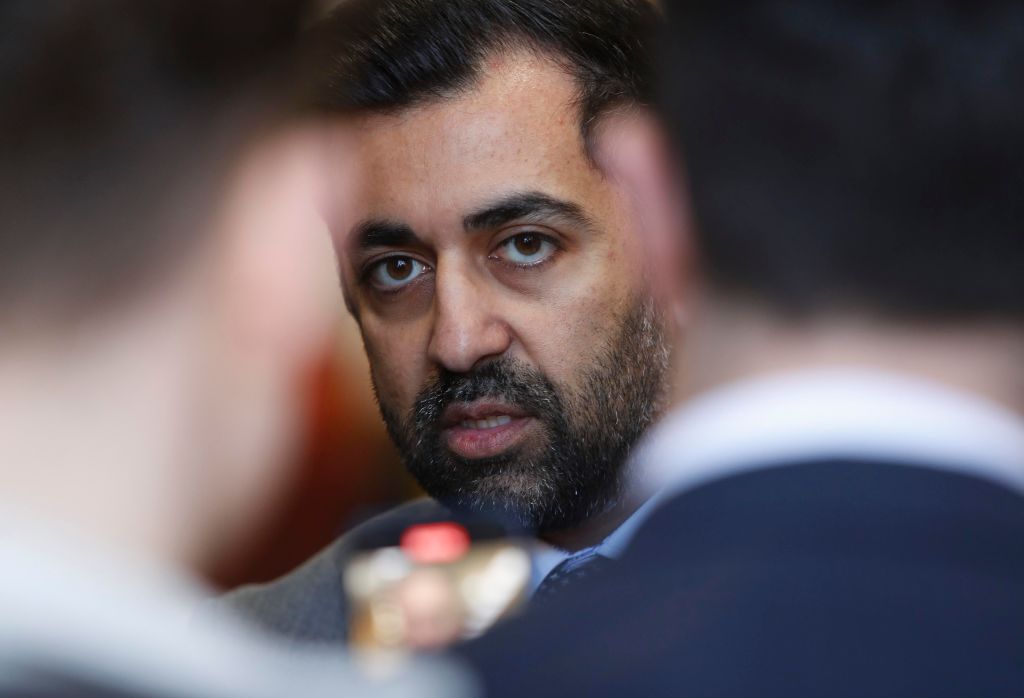Humza Yousaf’s decision to challenge the British government in court over Scottish gender laws is a tactical play. And yet it confirms just how little the new First Minister knows about tactics.
Yousaf is having a terrible old time of it. Almost half of SNP members voted against him becoming leader. He has stuffed his government with loyalists: just one of his 27 ministers endorsed his leadership rival. The SNP’s finances are under police investigation, former chief executive Peter Murrell was arrested, the home he shares with Nicola Sturgeon raided by officers, and Yousaf only just learned that his party’s auditors quit months ago. (Neither Murrell nor anyone else has been charged with any offence.)
Reopening these wounds will dismay many SNP members and supporters
This seems an apt moment to push the Brit-bashing button. Ordinarily, a messy court battle that pits plucky little Scotland against the big, bad bullies at Westminster might distract attention from internal SNP woes. Ordinarily, picking a fight with London would bring the party’s various factions together in shared outrage. Ordinarily, the liberal commentariat could be expected to hail the SNP’s progressive stance and scold the Tories for undermining devolution.
These, however, are not ordinary times, which is why Yousaf has almost certainly made a mistake in choosing this play. The UK government’s decision to block the Gender Recognition Reform (GRR) Bill, pushed through Holyrood in a spurt of late-night law-making before Christmas, was the first time Westminster had prevented a Holyrood Bill from becoming law. In different times and circumstances, that decision would have faced major cross-party pushback. But the GRR Bill, while passed overwhelmingly by MSPs, is unpopular with the voters and divides SNP members.
It is also tied up in many people’s minds with Adam Graham, a man who was convicted of two rapes and, after self-identifying as a woman called Isla Bryson, was initially held in a women’s jail. His placement there was guided by a separate policy to the GRR Bill but, coming on its heels, prompted a backlash and a rare climbdown by the SNP government. It was an acutely difficult time for the party and might have contributed to Sturgeon’s decision to resign.
Reopening these wounds with a court challenge will dismay many SNP members and supporters, even those not necessarily hostile to the GRR Bill. It will deepen fissures already aggravated by the leadership election. It will put the SNP and its government on the wrong side of public opinion on an emotive issue.
A majority of Scots don’t support allowing 16-year-olds to change their sex without the involvement of medical experts. A judicial review will remind them of this policy, underscore its continued presence as a Scottish government priority, and use their money to hire expensive lawyers to fight about it in court. It would be akin to Rishi Sunak announcing a repeal of the hunting ban or Sir Keir Starmer proposing a debate on Zionism at the next Labour conference.
Of course, neither SNP supporters nor the public at large is the audience for Yousaf’s ploy. It is aimed at the activist class within the SNP and at the Scottish Greens, the SNP’s coalition partners without whom Yousaf would have no majority at Holyrood.
The Scottish Greens are a different beast to the Greens in England and Wales, relentlessly fixated on gender identity theory rather than environmental concerns. They would concrete the Cairngorms if Judith Butler told them to. Keeping them on board will allow Yousaf to retain his majority but it will reinforce the impression, growing within the SNP, that the Greens are calling the shots in the coalition.
It’s worth saying that Yousaf sincerely believes in gender self-identification and the rest of the provisions of the GRR Bill. He is a progressive and a millennial and it shows. Culture, values and identity matter more to him than the material concerns of a social democrat and perhaps even the struggle for sovereignty that animates the traditional nationalist. During the leadership campaign, he linked his support for trans rights to his experience as a religious and ethnic minority growing up in Scotland. Without using the word, he staked his leadership to the doctrine of intersectionality.
But even though Yousaf genuinely supports the GRR Bill, his attempt to use it to his tactical advantage is likely to fail. Emphasising your weaknesses and worsening your divisions is never good politics. Setting your face against public opinion can be perfectly noble but doing so on a highly sensitive subject, as a new leader of a troubled party, heading a beleaguered government, in a time of economic hardship, isn’t just a gamble. It’s banging on the casino door at 3 a.m. begging to be let in to put everything on black 21.
That’s the politics of the matter but what of the legal and constitutional considerations? If anything, the fallout could be worse here.
Nothing good can come of a judicial review. Assuming the court grants the petition, the Scottish ministers would have to convince the court that the Section 35 order was unlawful. That is a high bar to clear.
The Scotland Act allows the Scottish Secretary to make an order where he has ‘reasonable grounds to believe’ a Holyrood Bill would have ‘an adverse effect on the operation of the law as it applies to reserved matters’. Alister Jack set out a detailed statement of reasons for his order. The use of that mechanism has been supported by Lord Keen, a former advocate general for Scotland, and Dr Michael Foran, a legal academic who first proposed this course of action during the third stage consideration of the Bill.
What, though, if the court finds the Section 35 order to have been unlawful? The implications are hard to overstate. It would effectively confirm the ability of a devolved power to pass legislation altering the operation of laws passed by the UK parliament without that parliament having a say in the matter. That is an incendiary proposition and might finally prompt some movement at Westminster towards reform of the devolution settlement. Humza Yousaf’s short-term play could have long-term consequences.







Comments